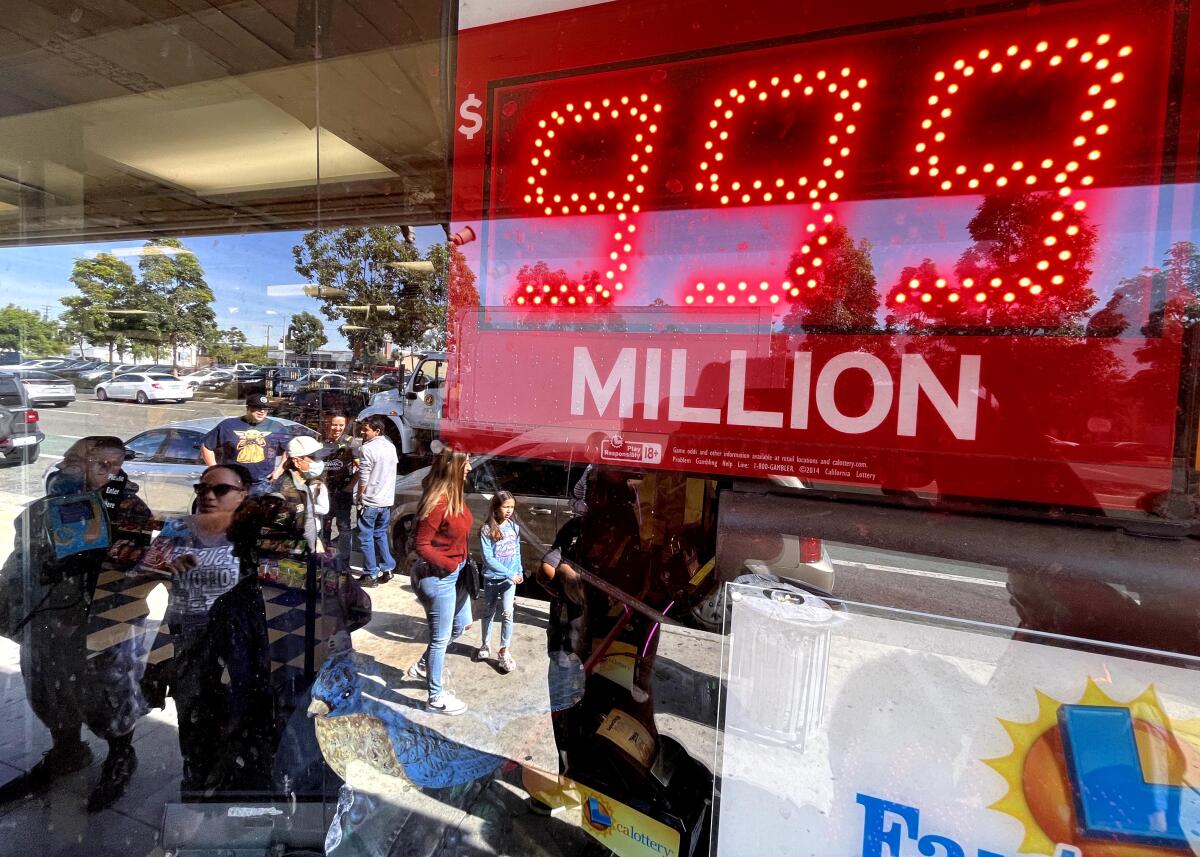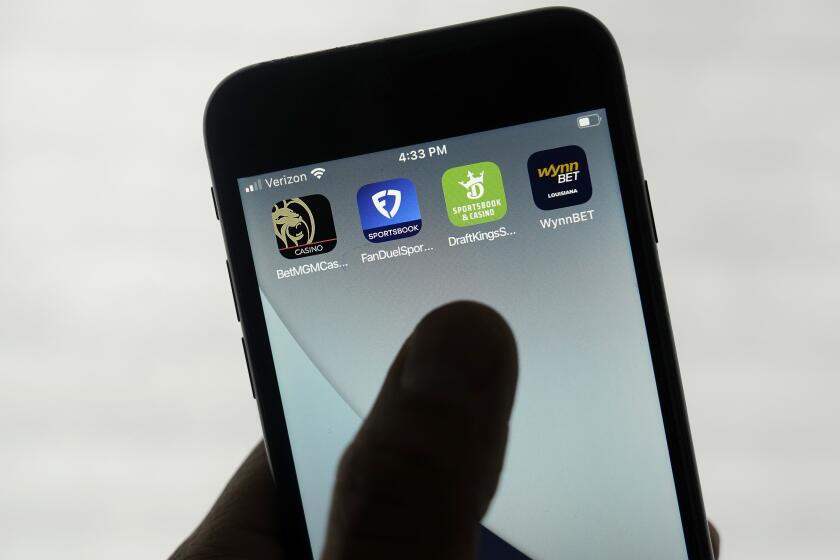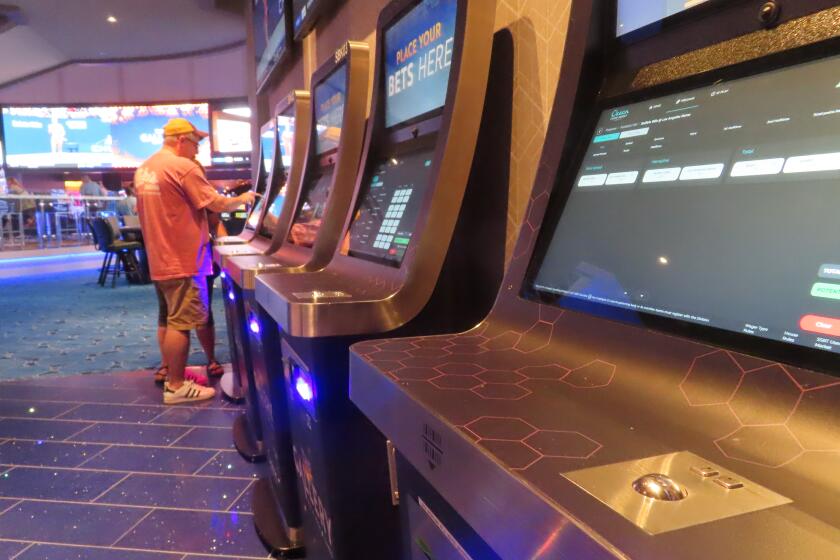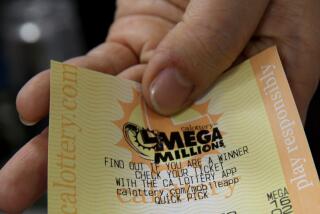No Powerball winner for billion-dollar jackpot, reviving (slim) hopes of fortune

- Share via
For the fourth time in Powerball history, the jackpot crossed the billion-dollar threshold this week after a drawing on Monday revealed no winners.
Then Wednesday night’s drawing continued the trend: There were no winners for the selected numbers of 11-38-41-62-65 and a Powerball of 15.
The prize climbed from $1.09 billion to an estimated $1.23 billion for Saturday night’s scheduled drawing.
Not all was lost, however.
Nine tickets were sold across the country with five winning numbers, with two of those in California. Each ticket holder with the five-figure match will reap just over $1.6 million.
The two tickets in the Golden State were sold at an Albertson’s in San Dimas and Oxnard Shores Bottle Shop in Oxnard.
Starting in 2016, Powerball changed the rules, charging more per ticket and making it harder to win. The effect? Achieving faster and bigger jackpots that tempt even the most rational-minded person.
Jonathan Cohen, historian and author of the book “For a Dollar and a Dream,” said we can continue to see jackpot numbers ascend to more ridiculous heights even as the chances of winning remain 1 in nearly 300 million. You’re more likely to get struck by lightning twice.
“There’s this phenomenon called jackpot fatigue,” Cohen said. “People get used to a jackpot size, and then they just expect a bigger amount next time.”
Why are people so enraptured by the illusive near-impossible-to-win prize?
The Shohei Ohtani case is a clear indicator of how toxic sports betting can be. Legalizing it in California would make it dangerous to sport itself.
Lotteries are a symptom of an inequitable society in which people believe the American dream is harder to achieve than ever, Cohen said. The tantalizing allure that a $2 ticket could bump you into a higher-income class overnight is difficult to resist, he said. Though the data are still unclear whether people buy more lottery tickets as the economy suffers, disposable income to spend on gambling drops.
State-managed lotteries such as Powerball and Mega Millions generate some money for parks and education. Americans spent $108 billion on lottery tickets in 2022, with about $25 billion generated in taxes for states, said Victor A. Matheson, an economist at the College of the Holy Cross who’s studied lotteries.
“From the state’s point of view, this is a voluntary tax,” Matheson said. “No one’s mad because no one’s making you buy a lottery ticket. So if the lawmakers need to raise a little bit of money, they would rather institute a lottery than increase income taxes.”
Timothy Fong, who co-directs the UCLA Addiction Psychiatry Clinic, considers lotteries as just another form of gambling.
Most of the patients Fong treats struggle with overspending on items that offer instant rewards such as slot machines or scratch-offs, unlike the jackpots that are drawn twice or three times a week. Fong said it’s hard to feel bad about losing money on a lottery when you’re sold on the idea than you’re still helping somewhere.
The U.S. sports betting market is growing astronomically, and so are losses by gamblers. Legislators need to act now.
“They’re saying it’s OK for you to spend money in the lottery [because you’re] helping the schools,” Fong said. “So that’s a beautiful business tactic, to take away any sense of guilt.”
Does the lottery do more to hurt or help the public good? Fong said it’s not entirely clear.
“The lottery does give money back to gambling addiction treatment, but it’s a very tiny fraction of that budget,” he said. Lotteries, especially scratch-offs, are popular in low-income and nonwhite communities, and the effect is a regressive tax that Fong worries affects people’s quality of life.
The slim odds don’t seem to deter lottery players who buy more tickets as the prize reaches astronomical levels.
These games “offer the only way for a very, very small investment you have the chance at like billions of dollars,” Cohen said. “I think it will ensure their appeal for a long time regardless of other trends that might shape the future of the lottery.”
Do experts have any advice on improving your odds of winning?
“If you want to have a little bit more chance of winning more money, don’t pick your lucky numbers,” Matheson said. If your lucky numbers match with someone else’s, you’ll have to share your winnings, he noted, adding that choosing birthdays are also a losing strategy.
Matheson himself doesn’t bother with lotteries because he’s done the math. “The chance of winning is almost identical whether I buy a ticket or not,” he said. “Economists, we’re generally not gamblers.”
Time staff writer Matt Hamilton contributed to this report.
More to Read
Sign up for Essential California
The most important California stories and recommendations in your inbox every morning.
You may occasionally receive promotional content from the Los Angeles Times.












